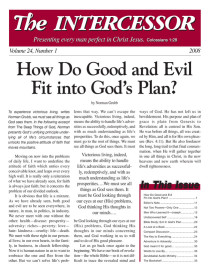
Compact Discussion – Joseph
A review of Norman Grubb’s two CD series–Joseph
Joseph- Great Dreamer, Nation Saver
Joseph said to them, "Do not be afraid, for am I in the place of God? But as for you, you meant evil against me; but God meant it for good, in order to bring it about as it is this day, to save many people alive".
We all know the story of Joseph, but in this two CD discussion, Norman sheds new revelations on Joseph and his circumstances–truly delving into the deep things of God. Norman starts out saying that this is another story of the ways of God, the ways of the Spirit through a human life. He points out that Joseph was different from his brothers: pure in youth. While his brothers liked to be out away from the family moral influence, Joseph took a lonely stand against sin in the family circle. Norman goes on to say that God does not talk to unconcerned people; deeper dealings of the Spirit are only possible in lives that are wholly given to God.
So Joseph was already set apart spiritually, and Norman traces the dealings of God to completely establish him in the Spirit. The stage is set, first, with the animosity from his brothers that was necessary for God to fulfill His will. After it became obvious to his brothers that Jacob favored Joseph above the others by giving him a beautiful coat. Joseph really drove in the animosity spike by sharing his two dreams. First, "We were binding sheaves of grain out in the field when suddenly my sheaf rose and stood upright, while your sheaves gathered around mine and bowed down to it." Whoa! As you can imagine, his brothers’ responses were not friendly. Norman says that it is Joseph’s second dream where he truly becomes fixed in the Spirit: "This time the sun and the moon and eleven stars were bowing down to me." Why did Norman say that Joseph became fixed at this point? Because in the second dream his father, Jacob, was also bowing down to him–a whole different picture.
In the section dealing with Joseph’s slavery in Egypt, Norman now focuses on Joseph as an obedient servant of God, fixed in Him and carrying out His will. Norman says that Joseph understood that God is in everything, including adversity–and ultimately, "God determines, not permits." Joseph did everything with a great attitude and very well. In this Potiphar saw that "the Lord was with him, and that the Lord gave him success in everything he did." Potiphar put Joseph in charge of his household, and because of Joseph the blessing of the Lord was on everything Potiphar had. So in Joseph’s circumstances as a slave, God was training him in Potiphar’s house to run Egypt.
When Potiphar’s wife tried to seduce Joseph, lied about the situation, and Potiphar put Joseph in prison, once again, Norman says, Joseph saw God in all of his circumstances. "With God," says Norman, "evil is just another form of good–He will use it for his own ends." This is a bold, powerful statement. Norman gives more insight when he says, "Could a believer’s progress ever be more sharply downward than his? How did he retain his faith and not become an atheist? Every indication is that Joseph, distressed and mystified, bowed the neck to God’s will."
Now, you can hear the emotion in Norman’s voice as he speaks of Joseph’s time in prison, for Joseph did not skip a beat. His obedience and trust was so complete that once again he was given responsibility for all that was done there. But even when Joseph rightly interpreted two more dreams, he was forgotten for two more long years.
It is at this point–when Norman talks about Joseph’s dramatic meeting with Pharaoh and interprets Pharaoh’s dream because no one else could–that you start to see God’s ultimate plan. We know the plan because we know the story. What Norman emphasizes is that Joseph did not; he just trusted and was obedient in the next moment, despite the long period of time of being sold into slavery and then being falsely imprisoned. As Norman points out, Joseph was ready when summoned. No problem. Let me just shave and clean up a bit; I’ll be right there!
Norman says Joseph was fixed in the Spirit. How do we know? When Pharaoh asked Joseph to interpret his dreams, he replied, "I cannot do it, but God will give Pharaoh the answer he desires." Amazing, amazing, amazing. Then Pharaoh describes his dreams, Joseph interprets them, and proposes a solution. And Joseph is put in charge of all Egypt.
Norman’s insight in this next part is fascinating as he describes the process that God takes to bring Joseph’s brothers to repentance for selling him into slavery. Step by step Joseph secretly tricks the brothers until they truly take responsibility for their actions against him. Finally, Joseph reveals God’s ultimate purpose: "Do not be distressed, as it was not you who sent me here, but God . You meant this for evil, but God meant it for good for God sent me before you to preserve a posterity for you in the earth and to save you by a great deliverance."
A few things that I took notice of in listening to Normans CD’s: 1. How Norman can take a well-known story in the Bible and shed insight of a truly revelatory nature; 2. Joseph was the same throughout–in adversity and in prosperity. And in each case–under Potiphar, the prison warden, and Pharaoh–they saw that the Lord was with Joseph. 3. I personally can only conclude that in life, what is meant for evil, God means for good.
I highly encourage you to acquire these CD’s and listen to them, as I know they will make an impact on you.





